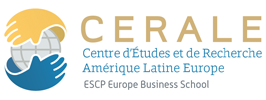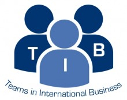Our aim is to develop and provide intercultural, diversity and inclusion management research and solutions for practitioners by developing and running practice-oriented and academic research projects.
Exemplary Overview of Completed Projects:
- Evaluation of the German law to promote equal participation of men and women in leadership positions
- Intercultural leadership adjustment of expatriates
- The effect of culture on perception and cognition
- Cultural moderators in intercultural business negotiations
- Cross-country differences in partner promotion processes of professional service firms
- Country-specific performance management profiles
- International and country-specific compensation systems
- French management style
- Growing luxury markets in lower-middle income countries (e.g. India)
Prof. Dr. Marion Festing about Intercultural Management & Intercultural Leadership
Associated Research Centres

Centre d’Etudes et de Recherche Amérique Latine Europe
The centre aims to promote groundbreaking research in broad management issues by mobilising jointly, fully experienced teams of European and Latin American researchers.

Teams in International Business Research Centre
The centre aims to advance scientific knowledge at the intersection of two areas: International operations of companies and teams that have to perform various tasks.

INCLUDEE Research Centre
The centre aims to yield insights into how to manage individual differences to create a more inclusive organisation, were they companies, schools, governmental or non-profit organisations in general.
Detailed Project Examples
Success Factors for Western Expatriates in Russia
In terms of international assignments, Western expatriates and human resources (HR) departments find Russia to be one of the most challenging destinations. Why? Well, one of the key reasons is the often profound difference in leadership behaviours between East and West, and so managers have a keen interest in understanding which management styles are necessary to succeed in a Russian professional setting. In a series of 35 one-hour interviews, we set out to gain a thorough understanding of leadership-related success factors for Western expatriates in Russia. Three key findings emerged from the research:
It is necessary for expatriates to become more authoritarian, though not as much as the Russians themselves. They must also find the right balance between authority and a people orientation, and finally, they must learn to motivate Russian employees through a combination of control and rewards. This necessarily has implications for HR departments, because they need to adapt their pre-departure training and ongoing support programmes differently and more extensively than in other countries.
Cultural Moderators in Business Negotiations
Transactions in business-to-business markets frequently rely on negotiations between selling and buying companies, and these negotiations often cross borders whereby the buying company originates from a country that is different from the selling company’s country of origin. Not surprisingly, cultural differences between teams in these companies can complicate the negotiation process and may lead to the use of negotiation strategies, where one party wins only at the expense of the other.
One idea to overcome these challenges is to equip negotiation teams with a ‘cultural moderator’, an individual who has the same cultural background as the business partner. In a case-study-based negotiation simulation with more than 200 participants, the authors were able to show that depending on the degree of the cultural moderator’s collectivism, such a moderator can help to design a negotiation process that focuses on win-win agreements rather than on win-lose scenarios. However, the use of particular negotiation strategies was only weakly (if at all) connected to economic outcomes of the negotiation. Interestingly, despite the fact that a cultural moderator can increase or decrease the focus on win-win agreements, he/she consistently helps teams to improve their economic outcomes (such as increasing profits) in negotiations.
Contact

